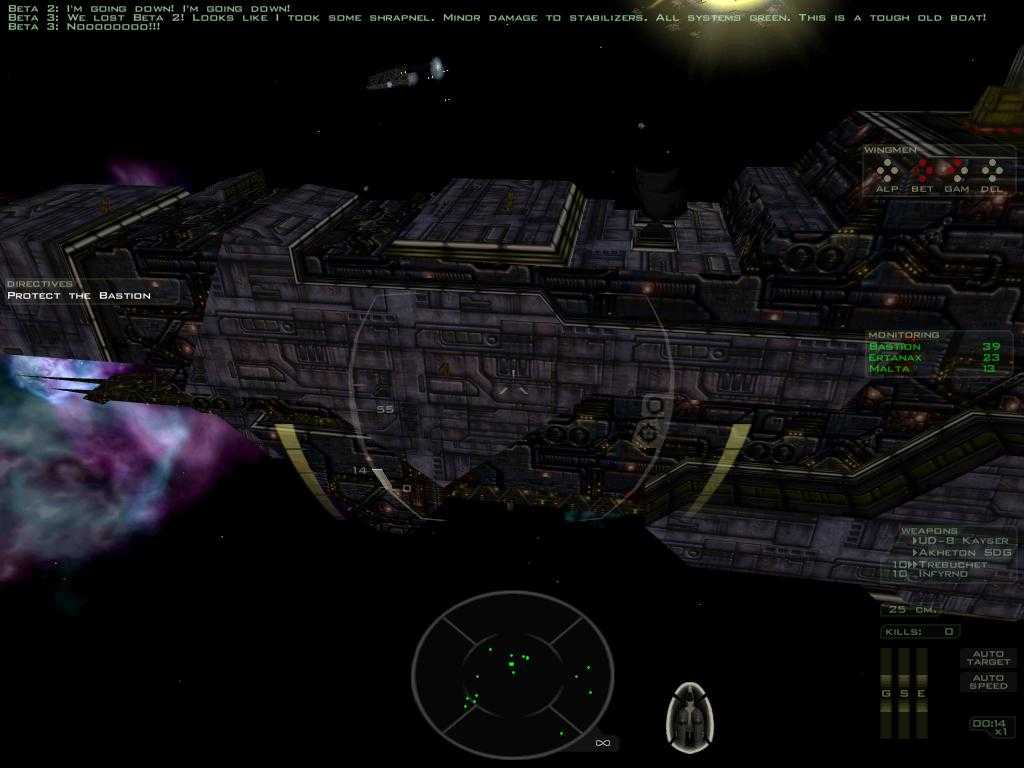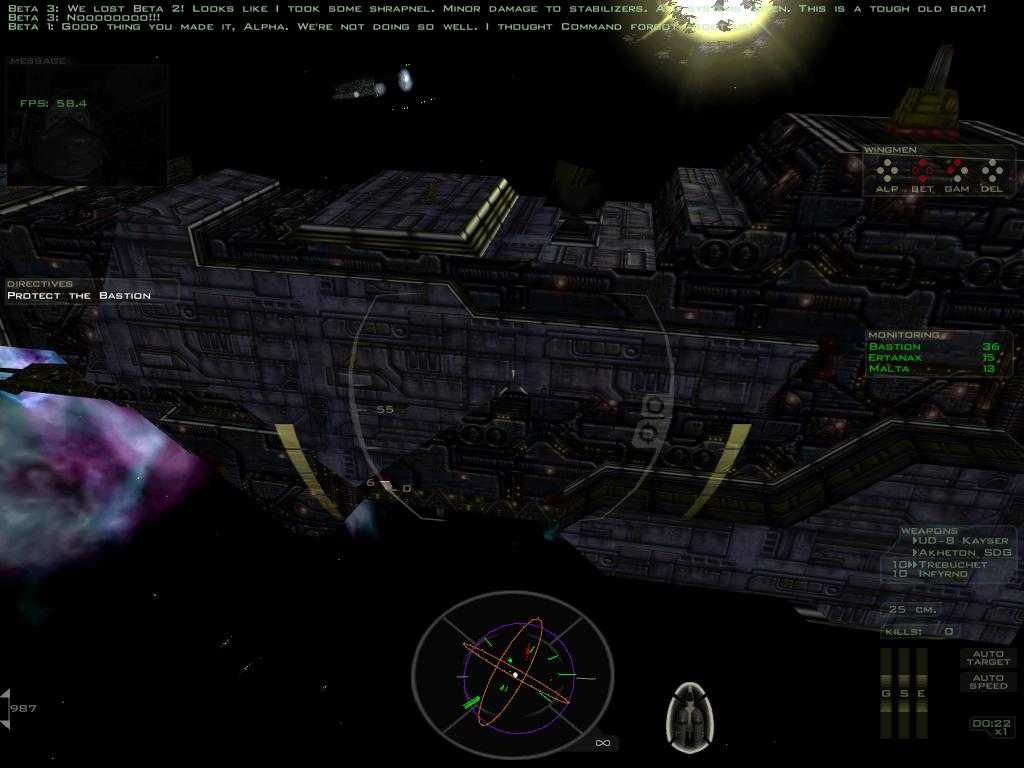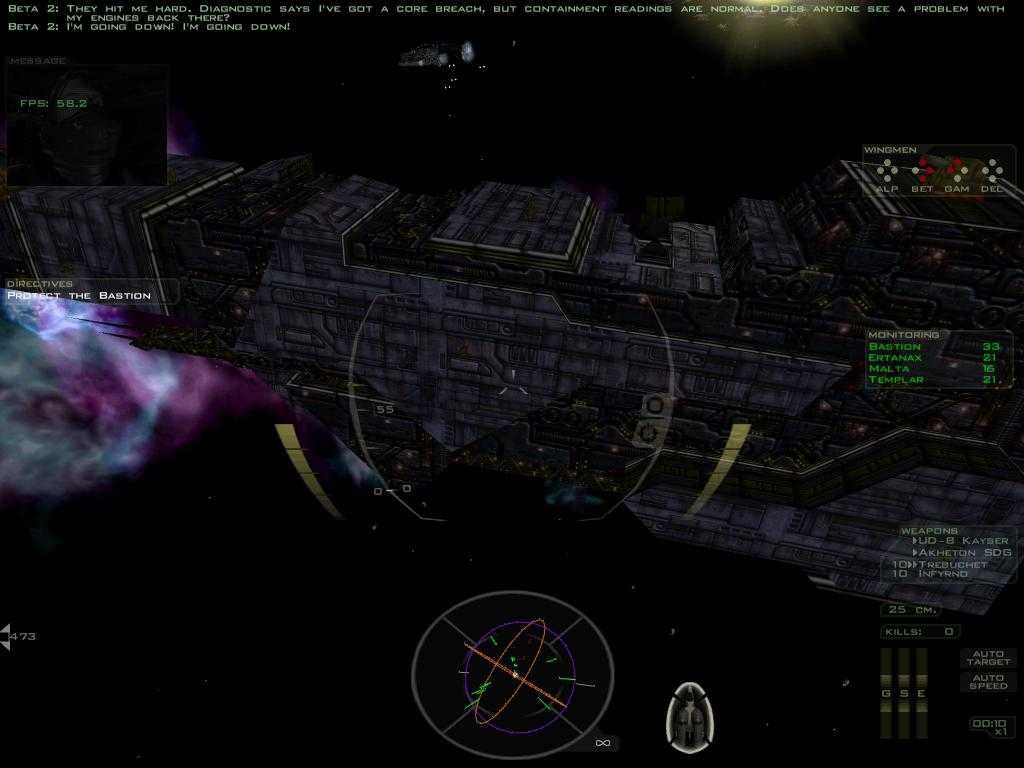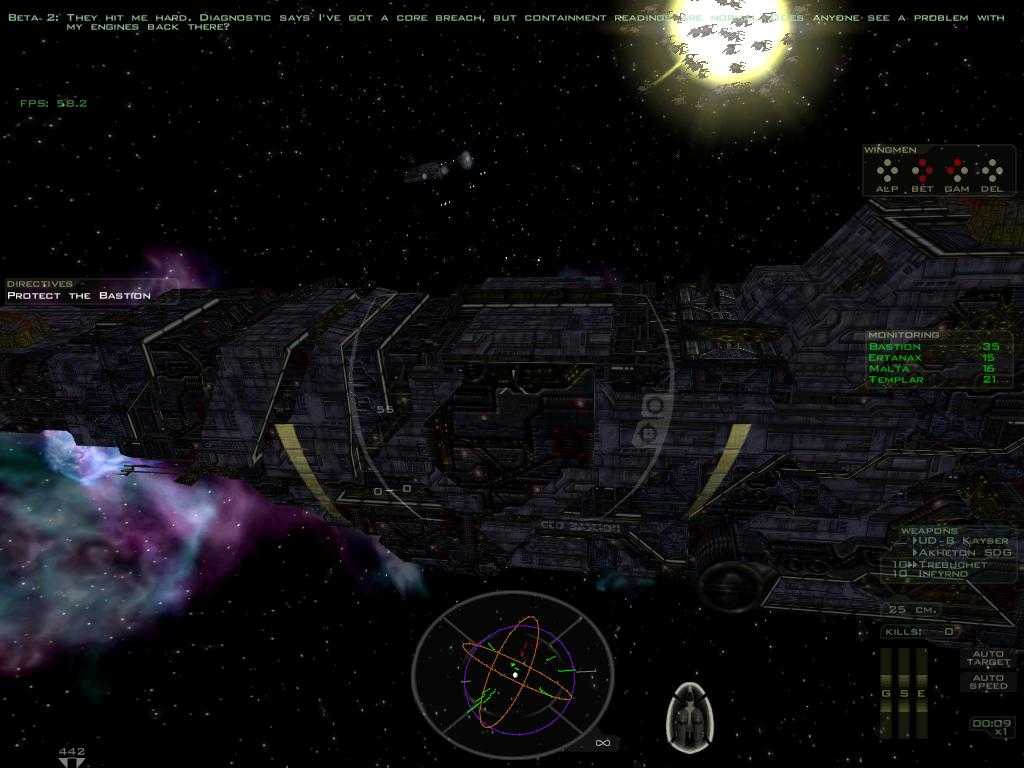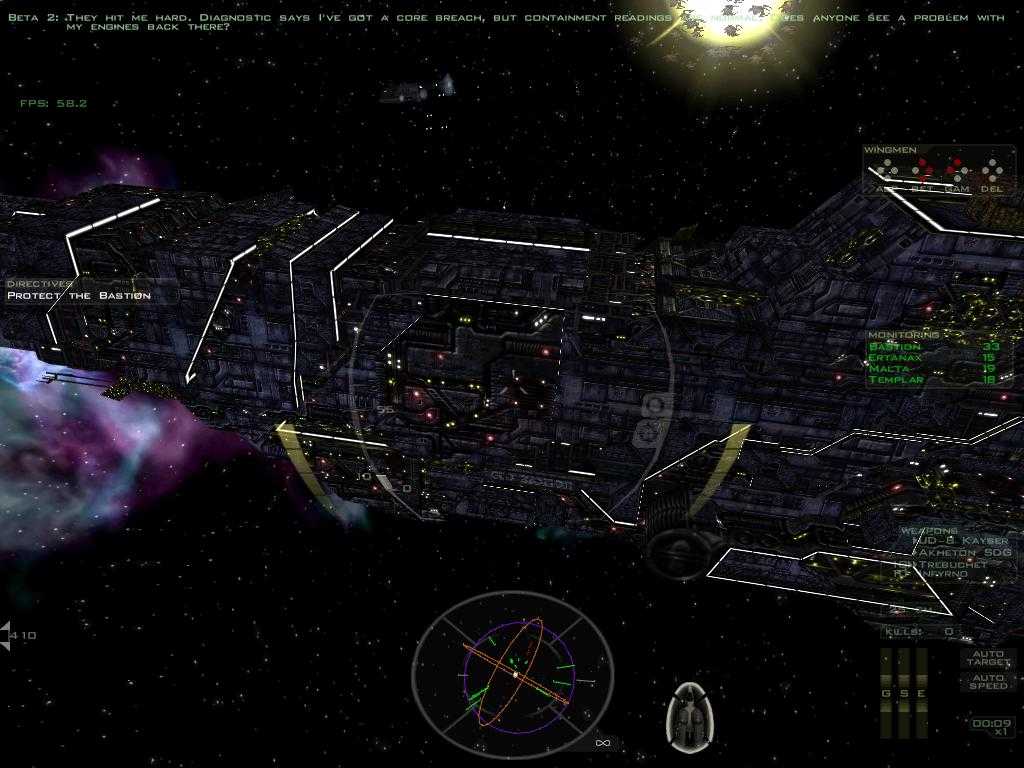MediaVPs (or Media VPs, or MVPs, etc etc) are VP modules for Freespace 2 Open (a product of The Freespace 2 Source Code Project) which alter, improve, or even repair certain aspects of the game. They come in various pieces which can be downloaded and installed incrementally and individually, and they are (like the rest of the game) absolutely free. They represent an attempt to bring Freespace 2 into the "modern age". On this page I will provide example screenshots for comparison of what the game looks like with various portions of the MediaVPs, with default options or with some options specified, et cetera.
Introduction
I was inspired to do this because I was wondering just how big a difference all that damned downloading (I live in the sticks and have only a modem connection to the internet — and a poor one at that) actually made. As it turns out, it's quite a lot.
Methodology
I attempted to use a fairly rational software base for this experiment. The versions I am using are the current release versions. The hardware is modern and more than up to the task of displaying the enhanced content (frame rates haven't fallen below 59 in any gameplay with all my installed MediaVPs yet.)
Software
The version of FS2Open used was the 3.6.9 from the Linux binary installer. The MediaVP version is 3.6.8 Zeta. Where necessary, the appropriate "patch" VPs were used to make MediaVP 3.6.8 Zeta compatible with FS2Open 3.6.9.
Hardware and Settings
I took all screenshots at a 1024x768 (XGA) resolution at 32 bits color depth. I'm using an NVIDIA Quadro FX1500 256MB graphics chip - it's in my laptop. For whatever it's worth, I've used nvidia-settings to set 4x Bilinear Antialiasing, 4x Anisotropic filtering, and texture sharpening (overriding application settings.) Whether that shows here or not, I can't say. I'm running the game in Linux, so naturally I'm using the OpenGL renderer. I'm using NVIDIA drivers 100.14.11. All graphics details configurable from within the game are turned up all the way.
Taking the Screenshots
Screenshots are shot in the mission simulator. The mission is "Clash of the Titans II". I turned to the right and shot three screenshots at intervals along the GTC Bastion, then selected one screenshot from each set in such a way as to get screenshots that covered approximately the same area for each set of settings.
Screenshots were converted from TARGA (.tga) to JPEG/JFIF (.jpg) format through the following means:
for i in *.tga do tgatoppm $i | ppmtojpeg > "`echo $i | sed 's/\.tga/.jpg/'`" done
Or something like that.
The Options
There are so far five screen shots. They are as follows:
But what does that mean? The Defaults set are taken without specifying any options to fs2_open, either on the command line or in the cmdline_fso.cfg file. Only graphic options enabled by default are active. The Options set has the following options: "-spec -env -glow -jpgtga -mipmap -missile_lighting -cache_bitmaps -targetinfo -orbradar -ballistic_gauge -rearm_timer -ship_choice_3d -3dwarp -warp_flash -snd_preload -fps"
The Screenshots
The following screens are displayed at VGA (640x480) resolution, so that they will fit on the page. Clicking the image takes you to the original XGA (1024x768) screenshot. XGA was chosen because it is the highest resolution officially supported by any of the game content. This is (sadly) true of basically every module as well, including the Freespace 1 Port
Defaults
This image depicts FS2Open started with no options and no VPs beyond the commercial campaign files. It was pretty exciting when the game came out - this is pretty much identical to the original retail game. Let's see what it looks like if we just specify a few options:
Options
Again, this is with the following options specified: "-spec -env -glow -jpgtga -mipmap -missile_lighting -cache_bitmaps -targetinfo -orbradar -ballistic_gauge -rearm_timer -ship_choice_3d -3dwarp -warp_flash -snd_preload -fps. There's not much to see here, mostly because some of these options are defaults (-spec, I believe; certainly -jpgtga; possibly -mipmap, and so on. The -orbradar provides the new, 3d radar display, using -glow, -spec and -env cause reflection and additional lighting which is sort of hinted at here but which you don't really see until you get up close and find out that things are shiny.
MediaVP Core Only
There's not any real difference to see here. It's not until you start loading modules and textures that things really change. Still, the MediaVP core institutes some bug fixes that are worth loading. The default cubemap may slightly improve graphics with the -env option. The core VP also includes the base 3D warp effect model, but you won't see that here.
Media VP Core, Models Only
This is the first huge visual difference. The high-poly models are substantially different. The Bastion's shape has changed significantly, for example note the rounded area near the bottom of the model, or the change in the radar dishes on top (they've moved, and they're different.)
The models VP also includes the high-resolution starfield. Compare core and models to see the difference, which is really quite major.
MediaVP Core, Models, Textures
Another substantial leap forward. Some of the differences are visible even at this resolution (VGA - click for the XGA-res images) such as the legibility of the name badge. Brightness of the various lighting effects is enhanced for added prettiness and although you can't particularly tell from these shots, you have to get a lot closer before it becomes jaggy. The nebula in the background (lower-left) is very patchy right up until you install the new textures, both apparently being constructed ina low bit depth, and having texture compression issues. (There is also some JPEG artifacting in my screenshots, but you can still see the positive difference.)
What's in which Media VP?
This information is culled from the MediaVP 3.6.8 Zeta Release Announcement and is deliberately incomplete; for the full story, and for credits as to who developed what, read the announcement itself. Keep in mind that all Media VPs depend on the mv_core.vp, and that advanced effects depend on the basic effects VP. To the best of my knowledge there are no other dependencies and you can mix and match at will. The models and effects VPs make the biggest graphic impact on the game, followed by textures and advanced effects. If you are on a slow connection, you should definitely start with core, models, and effects, and work your way up from there.
core
mv_core.vp includes numerous minor enhancements including the 3d warp model, a four-player coop version of the main campaign, default environment map cubemap, and some various bug fixes. These are the things you're most likely to notice, anyway, besides the splash screen.
models
The models VP includes high-poly models for almost all of the ships in the game and for some of the bombs and such, as well as a higher-resolution background starfield, some bugfixed textures, nameplates for almost all terran ships, and some glow maps.
textures
The textures VP provides high-resolution textures not just for the vast majority of ships in the game, but shine and glow maps for all vessels.
effects
The effects VP makes some of the most visually distinctive changes in the game, especially weapon effects (which you see a lot of) and all the various high-resolution content, including planet images, planets, suns, engine glows, a much-enhanced warp effect highly reminiscent of Babylon 5, high-res nebulas, and 3D shockwaves.
adv_effects
Advanced effects include super high-res planet images, higher-resolution nebulae, and the super-high-resolution 3D shockwave effect. These are absolutely only for high-end computers. This doesn't mean you need a SLI setup, even today; in fact you don't need any super high-end machine, just something of some quality today. I have a laptop with Core Duo T2600, 2GB RAM, and a NVIDIA Quadro FX1500 256MB, and I play with all options and all MediaVPs (except cell, see below) and a screen resolution of 1680x1050 (my panel's native resolution) with a very solid 55-57 frames per second. It's as if I have the system set to match the vertical retrace intervalmv_effects.vp) and you won't miss them all that horribly if they're gone.
It's also possible to break open the advanced effects VP file and place some of the effects into a directory so that you can use just some of them, which can make a big difference for some people, especially with some graphics cards (and most especially with those with shared memory.) Doing this, however, is outside the scope of this document.
cell, music
In addition there are two more Media VPs available; one includes high definition music for several missions by Daniel Wentz, and the other is a pack of cell shading materials (ship textures, nebula and planet images) which go with the -cell commandline option. Neither is really significant to this article; you can't see music, and the cell shading effects basically seem to consist of a pack of textures. I get the feeling that it is very much a work in progress. If you load it and fly right up close to some fighters you can see the new textures. If you want to try this feature out, this is how I suggest you do it (on Linux):
- Unpack all of the Media VPs that you will be unpacking except for the mv_cell.vp, into whatever directory you keep them in (typically a subdirectory of the FS2Open dir, and usually called
mediavps. - Make another directory, I called it
mod_cell, and unpack mv_cell.vp here. - Make hard links
Why hard links? Because I had problems using symbolic links for this. Since the files are on the same filesystem, you can use hard links. You can also copy the files, which takes up more disk space. You will HAVE to copy the files on Windows, since it doesn't have hard links - or you can put the modules in different directories and use multiple from the-modflags.mv_core.vp(mandatory) andmv_music.vp(optional) VPs in the cell mod directory. Assuming you use my directory names, and you have already unpacked the Media VPs, it would look like this:
mkdir mod_cell cd mod_cell unzip ~/Downloads/mv_cell.zip ln ../mediavps/mv_core.vp ln ../mediavps/mv_music.vp
You would then start the game with fs2_open -mod mod_cell instead of -mod mediavps.
Summary
Installing the Media VPs is well worth the additional disk space, but it does stack up a bit:
-rw-r--r-- 2 0 0 9692874 2006-05-21 14:14 mv_core.vp -rw-r--r-- 1 0 0 191554534 2006-05-21 14:27 mv_models.vp -rw-rw-r-- 1 0 0 2640833 2006-07-10 18:05 mp-710_models.vp -rw-r--r-- 1 0 0 188368097 2006-05-21 11:36 mv_textures.vp -rw-r--r-- 1 0 0 93891138 2006-05-21 14:43 mv_effects.vp -rw-rw-r-- 1 0 0 3112274 2006-07-10 18:05 mp-710_effects.vp -rw-r--r-- 1 0 0 255954351 2006-05-21 14:21 mv_adveffects.vp -rw-rw-r-- 1 0 0 87080647 2006-07-10 18:04 mp-710_adveffects.vp -rw-r--r-- 2 0 0 12109934 2006-05-21 11:36 mv_music.vp -rw-r--r-- 1 0 0 22658333 2006-05-21 11:35 mv_cell.vp
That's right, the full set of Media VPs is 827MB, on top of the 1209MB for the basic game data (version 1.2.) The AVI movie files I've got are 287MB (not that they do you any good on Linux so far) so all told just game data takes up 2323MB. So far my fs2_open directory is consuming 3343MB, and counting. If you are short on disk space, you might consider foregoing the MediaVPs, but in the long run they are a small part of the total disk space usage and a big improvement. I've also been downloading only the smallest campaign modules so far, with the largest download to date consuming a little over 7MB (compressed) so you might imagine what things would look like with 45MB-download campaigns.
Here's a list of the original compressed files: (now with download links)
-rwx------ 1 1000 1000 3009596 2007-07-29 21:42 mv_core.zip -rwx------ 1 1000 1000 69753642 2007-07-30 10:26 mv_models.zip -rwx------ 1 1000 1000 841287 2007-07-30 09:38 mp-710_models.rar -rwx------ 1 1000 1000 88194730 2007-08-02 14:54 mv_textures.zip -rwx------ 1 1000 0 25366002 2007-08-02 19:09 mv_effects.zip -rwx------ 1 1000 0 949442 2007-08-03 08:20 mp-710_effects.rar -rwx------ 1 1000 1000 78481179 2007-08-04 05:47 mv_adveffects.zip -rwx------ 1 1000 1000 16380313 2007-08-04 09:11 mp-710_adveffects.rar -rwx------ 1 1000 1000 12071457 2007-08-04 13:44 mv_music.zip -rwx------ 1 1000 1000 1837491 2007-08-04 11:19 mv_cell.zip
As you can see, the models and textures VPs are each about 80MB downloads. Core was small, just a couple megabytes. The first effects vp was only about 25MB, while the advanced effects together with its 3.6.9 RC/Final compatibility VP came to about 80MB. You can also download the "mv_zpack", which includes core, music, textures, models, and effects in a single file (which is better for people with reasonably fast access to the internet - unlike me, at the moment.)
I expect to create a separate article to show off effects with and without the enhancement, since you wouldn't see anything in these screens anyway. The effects enhance things like weapon effects including fighter and cruiser weapons (the beam weapons are dramatically improved) as well as ancillary effects; for example, the subspace animation is far more detailed and has a pretty flash at the end (far beyond what is provided by the -3dwarp and -warp_flash options.)
Especially given its small size, the basic effects VP is one of the worthiest files in the archive, and installing the core and effects VPs would be the quickest way to see results. Textures enhance visual quality but don't really affect gameplay like models can - it could potentially be easier or harder to target certain turrets and/or subsystems with the new models. But the textures don't enhance the visual effects as much as the effects, as if that weren't obvious from the name. Depending on how you feel about music, and barring the cell effects VP which is a special case, either the music or the advanced effects are the most useless parts of the Media VPs. Some people have reported slowdowns on their systems due to issues with the advanced effects, so try disabling them if you have problems..vp (I use .vp-.)






